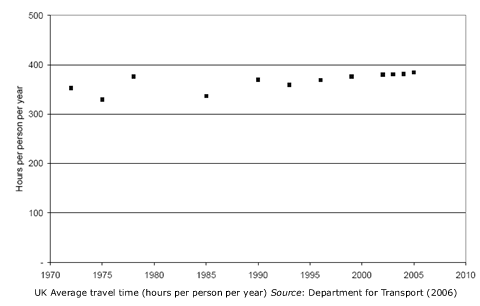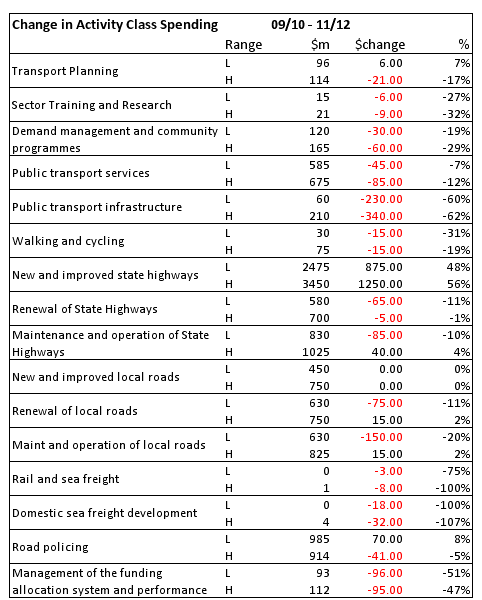Our submission on ARTA’s Regional Land Transport Programme and the Auckland Transport Plan.
Introduction
The Campaign for Better Transport (CBT) welcomes the opportunity to submit on the Draft 2009/10 RLTP and 11/12 Auckland Regional Land Transport Programme and the Auckland Transport Plan. Consultation with groups such as ours and wider transport stakeholders is vital to achieving better transport outcomes for Auckland.
The Campaign for Better Transport is an incorporated society with the declared objective of being advocates of public transport, cycling, walking and other alternatives to the private car. Membership consists of 50 paid up members, with a mailing list of over 3,000 at present.
The Campaign for Better Transport is a voluntary group and is politically independent.
Submission Points
Support for the RLTP and ARTA
1. The CBT generally supports ARTA’s Draft RLTP and associated Auckland Transport Plan, and thanks ARTA for the work put into the promotion, operation and expansion of Auckland’s public transport network.
Auckland’s Transport Challenges
2. Since the last review of the Regional Land Transport Programme, petrol prices broke the $2 a litre barrier for the first time. This was a significant contributor to the growth in public transport patronage over this period, and an associated fall in private vehicle use. It is therefore surprising that volatile petrol, diesel and oil prices are not mentioned as a transport challenge.
3. Nonetheless, the CBT supports the shorter-term challenges listed in this section, listed on page 12, in particular increasing choice and reducing reliance on private cars.
Statement of Priorities
4. The CBT supports the need for prioritisation of planned transport activities by Auckland’s territorial authorities, the ARC, ARTA and the New Zealand Transport Agency, given the limited funds available for transport projects and, in particular, public transport projects.
5. We would also support the inclusion of Ontrack railway developments in the prioritisation process.
6. Auckland’s vulnerability to oil price fluctuations is a risk to the economy that can be mitigated by prioritising transport projects that reduce our dependence on oil.
7. The CBT believes that the current measure of the economic efficiency of transport projects “benefit cost ratios” are deficient and overly emphasise travel time savings. Overseas studies show that travel time savings in the long run do not eventuate. Instead travel patterns change. Widening roads, for instance, encourages commuters to live further from work, yet still spend the same amount of time travelling that they previously did. UK residents, for example, spend on average 1 -1.1 hours a day travelling to and from work and leisure. This has held more or less constant since 1970, when records began. The CBT could find no evidence to suggest that in Auckland, commuter travel times have changed over the years. In fact there appears to be no statistics gathered at all in relation to the amount of time the average person spends travelling to and from work or leisure activities. This is surprising given the assumption with roading projects is that travel time savings in minutes are a long lasting, key benefit to the economy.

Monitoring
8. The KPI’s that exist for monitoring the goal of economic development benefits and associated costs are narrow. The Transport Agency’s travel time surveys, for instance, merely measure the average time it takes to travel between various points on the roading network. While these may be a useful measure of congestion, measures such as these do not adequately monitor how much time people spend travelling to work and leisure destinations over time. Nor do they adequately monitor the volumes of people using transport networks.
9. Similarly, while savings in vehicle operating costs are a regular feature of roading benefits, there are no KPI’s indicating whether household spending on private vehicles is changing over time. Statistics New Zealand’s most recent Household Economic Survey was in 2007. It found that, on average, Auckland households spent 7.4% of all expenditure on private transport supplies and services, compared with a nationwide average of 7%. We do not have any information about whether this expenditure has increased or decreased in recent years.
10. The CBT strongly urges ARTA to champion the use of economic benefit cost indicators that are more reliable in the long term, such as the benefits of access to an increased number of employment options for employees, broader economic measures such transport expenditure as a percentage of GDP, or indicators that measure the absolute capacity of transport corridors.
Government Policy Statement Targets
11. The Campaign for Better Transport supports the currently active GPS, with its specific targets:
Reduce kilometres travelled by single occupancy vehicles, in major urban areas on weekdays, by 10 percent per capita by 2015.
Increase the mode share of transporting freight by coastal shipping and rail by 2015.
No overall deterioration in travel times and reliability on critical routes by 2015.
Reduce fatalities and hospitalisations from road crashes by 2015.
Increase patronage on public transport by three percent per year through to 2015.
Increase number of walking and cycling trips by one percent per year through to 2015.
Reduce reliance on petrol and diesel
12. The CBT is aware that the Government is in the process of changing the GPS. We do not support the proposed changes, which are based on extremely poor transport planning assumptions. In particular, the recommendation that transport be funded according to the fact that 84% of the journeys to work in urban areas are by car is quite frankly bizarre and out of touch with the realities of public transport usage and growth in the Auckland region. The CBT urges ARTA to totally oppose the proposed GPS changes.
13. The CBT would especially like to highlight the proposed cuts to public transport and local road funding. We have analysed the changes in funding by Activity Class. The results are shown in the following table.

14. The CBT believes the proposed funding changes put unacceptable pressure on the funding of public transport and local roading maintenance projects. It is lamentable that given such a radical restructuring of transport funding, performance monitoring budgets will also be slashed by about 50%. We urge ARTA to enforce the Minister of Transport’s statutory obligation to have regard to the views of Local Government NZ.
Onehunga Rail Line
15. The Campaign For Better Transport was successful in raising local support and funding for the reintroduction of rail services to Onehunga, and so is very focussed on the objective of these services starting on time in December of this year. We are concerned that the construction of new stations on the Onehunga Branch Line is not mentioned in any detail in the Auckland Transport Plan, given that the targeted opening date is eight months away. Local consultation on this was promised some months ago now, but has still to eventuate. We urge ARTA to prioritise the construction of Onehunga railway stations as well as implement complementary feeder bus services to make the Onehunga line a success when it opens in December.
